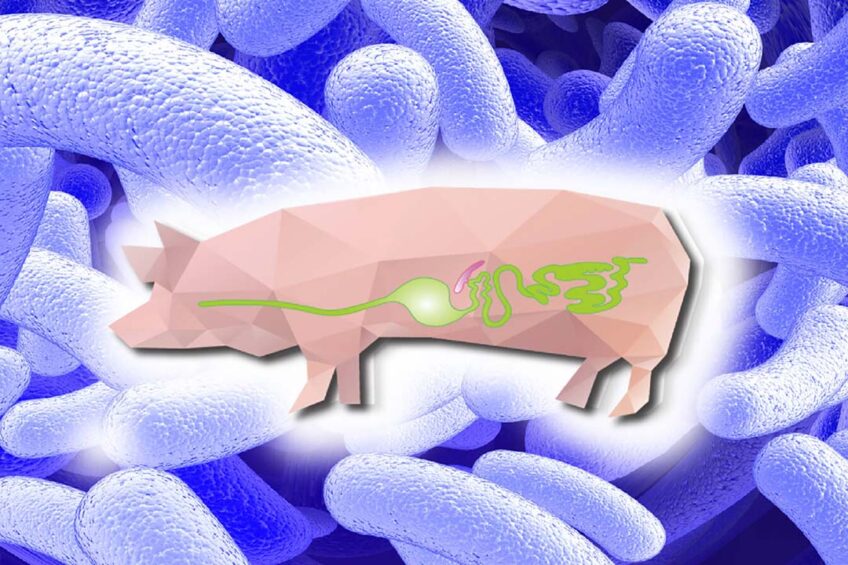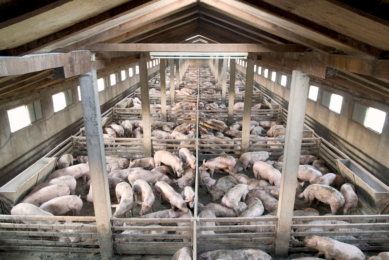Fermented product benefits pig gut health

The main function of the gut is to digest and absorb ingested nutrients. Gut microbes also assist the nutrient utilisation. Disruption of gut function leads to impaired health in animals. Dietary probiotic or probiotic-based fermented product supplementation can improve pig production by maintaining gut health.
PIG HEALTH SPECIAL 2024 – read all articles
Antibiotic growth promoters and zinc oxide were broadly used in swine feed to prevent diarrhoea and promote growth by preventing the adhesion of pathogens in the intestinal epithelium. Due to the emergence of antibiotic resistance in pathogenic bacteria and environmental concerns in swine production, many countries prohibited the use of antibiotic growth promoters and zinc oxide. Maintaining gut health is crucial for optimal production in pigs without the in-feed addition of antibiotic growth promoters or zinc oxide. One of the alternative options for disease prevention and growth promotion in animals is probiotics. Bacillus is an attractive probiotic for supplementation in swine feed due to its spore-forming ability, which allows Bacillus species to resist harsh conditions and feed processing steps. Bacillus species-fermented products produced by solid-state fermentation can be served as an alternative feed supplement to boost the gut health of pigs.
Gut function and factors affecting pig performance
The gut is a place to perform digestion and absorption of ingested nutrients. Enterocytes are the most important functional units in the gut whose primary function is the production of digestive enzymes and absorption of nutrients, electrolytes, and water. Enterocytes can produce mucus to form a physical barrier against pathogen invasion from the gut lumen. Cytokines, host defence antimicrobial peptides, and immunoglobulins can be made from gut immune cells to destroy pathogens and protect barrier integrity. The gut microbiota also participates in the digestion of nutrients, prevention of pathogen colonisation, and production of beneficial metabolites. Several factors can adversely affect gut functions in pigs, such as weaning, temperature changes, and mycotoxin-contaminated diet. These factors increase oxidative stress and damage barrier integrity, causing inflammation in the gut that leads to impaired digestion and absorption. Intestinal barrier integrity disruption and inflammation also trigger gut dysbiosis. Imbalanced gut microbiota further exacerbates the severity of inflammation in pigs.s.
Using Bacillus species-based probiotics to improve gut health
Bacillus species are gram-positive, endospore-forming aerobic or facultative anaerobic bacteria. Bacillus spores are resistant to heat, acid, bile salt, and digestive enzymes, and can germinate in the gut of pigs. Bacillus species also have the ability to produce antimicrobial lipopeptides, such as surfactin. The surfactin exhibits broad-spectrum antimicrobial activity against bacteria, viruses, and parasites (Table 1).
Unlike antibiotics, Bacillus species-derived antimicrobial lipopeptides disintegrate the cell membrane of pathogens according to various mechanisms, thereby slowing the emergence of drug-resistant bacteria. Bacillus species-derived antimicrobial lipopeptides exhibit anti-inflammatory properties on bacterial toxins-induced inflammation. Bacillus species-derived antimicrobial lipopeptides are also resistant to heat, acid, bile salt, and digestive enzymes. Bacillus species can be produced by submerged fermentation or solid-state fermentation. The solid-state fermented products contain both Bacillus probiotics and antimicrobial lipopeptides. Thus, the potential mechanisms of solid-state fermented products in the gut of pigs are Bacillus probiotics which regulate intestinal microbiota by competitive exclusion of pathogens, Bacillus species-derived antimicrobial lipopeptides which directly kill bacteria by destroying the bacterial cell wall, and Bacillus species-derived antimicrobial lipopeptides which reduce intestinal inflammation by modulation of the gut mucosal immune system. Many studies have demonstrated that supplementing pig diets with Bacillus species-based solid-state fermented products can increase immunity, reduce diarrhoea, prevent disease, and improve growth by creating a healthy gut (Table 2).
Maintaining gut health
Pigs face many challenges during their lifetime, including weaning, environmental stress, and a mycotoxin-contaminated diet. These challenges impair the gut health of pigs, leading to increased susceptibility to pathogen infections. Maintaining a healthy gut in pigs is particularly important for preventing disease and improving growth and reproduction. Bacillus probiotics and Bacillus species-derived antimicrobial lipopeptides are bioactive components in solid-state fermented products. These components can synergically reduce pathogen growth and prevent inflammation of the gut of pigs. Bacillus species-based solid-state fermented products are novel and natural feed additives to increase productivity by maintaining the gut health of pigs.






